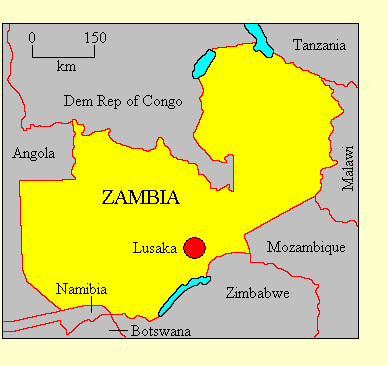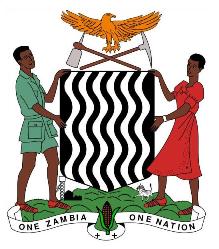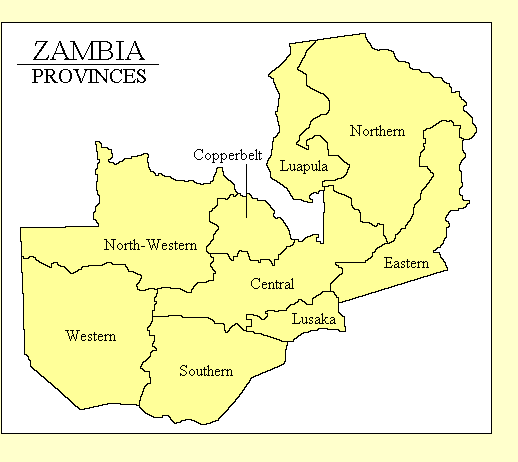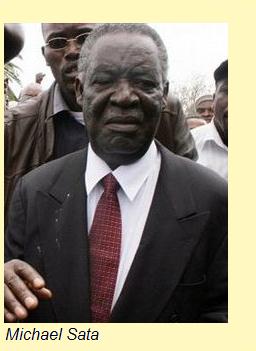

REPUBLIC OF ZAMBIA
• Official name: Repuiblic of Zambia
• Location: Southern Africa
• International organisations: African, Caribbean and Pacific Group of States, African Union, Commonwealth
of Nations, Non-Aligned Movement, United Nations, World Trade Organisation
• Borders: Angola, Botswana, Congo (Democratic Republic), Malawi, Mozambique,
Tanzania, Zimbabwe
• Coastline: None
• Land area: 752,614 Km2
• Population: 12,900,000
• Annual GDP (PPP) per capita: US$1,500 (2009 CIA estimate). World ranking: 167
• Ethnicity: Almost the entire population is of African Bantu stock. The largest
groups are the Bemba (34%), Tonga (16%), Malawi (14%) and Lozi (9%).
• Languages: English is the official language and is widely understood. Various
African languages are spoken corresponding to the ethnic groups listed above.
• Religion: Christian 70%, indigenous beliefs 20%, Moslem 10%.
• Form of government: Presidential democratic republic. Zambia is divided into 9
provinces.
• Capital: Lusaka

• Constitution: The Constitution of the Republic of Zambia came into effect on 2 August 1991.
• Head of state: The President, elected by direct universal suffrage for a five-year term.
• Head of government: The President, who appoints all ministers.
• Legislature: Zambia has a unicameral legislature. The
National Assembly has 159 members,
150 elected for five-year terms from single-member constituencies and nine appointed
members.
• Electoral authority: The Election Commission of
Zambia administers national elections.
• Freedom House 2011 rating: Political Rights 3, Civil Liberties 4
• Transparency International Corruption Index: 30% (101 of 178 countries rated)
• Reporters Without Borders Press Freedom 2010 Index: 78% (82 of 178 countries rated)
• Heritage Foundation Economic Freedom 2010 Index: 59.7% (91 of 179 countries rated)
Political history
British expansion in South Africa brought British agents into the Zambezia area, where
there were no powerful African states, in the 1880s, and the area was annexed in 1900 as
the colony of Northern Rhodesia. The expanding copper industry brought a large white
settler population into the country. In 1953 the country joined the Federation of Rhodesia
and Nyasaland, under white minority rule.
African resistance to the federation was led by the United National Independence
Party of Kenneth Kaunda. In 1963 the British accepted that the federation was unviable
without African support and Zambia became independent in 1964. There was little opposition
to Kaunda's party and in 1972 Zambia became a one-party socialist state. Although Kaunda
was widely respected internationally, his rule became increasingly authoritarian and his
economic policies had predictable consequences.

In 1991, to his credit, Kaunda allowed a return to multi-party politics, and held
presidential elections, in which he was defeated. His successor, Frederick Chiluba,
liberalised the economy but tried to violate the Constitution by seeking a third term
in 2002. He failed in this attempt and was later convicted for corruption by a British court.
He was succeeded by Levy Mwanawasa, leader of the
Movement for Multy-party Democracy (MMD). Mwanawasa was re-elected in 2006, but
died in 2008.
He was succeeded by his vice-president, Rupiah Banda, who won a special presidential election. Banda was
generally regarded as incompetent, and at the regular 2011 election he was defeated by
Michael Sata, the 74-year-old leader of the
Patriotic Front. Sata was a leading figure in Chiluba's government and his
democratic credentials are dubious.
Freedom House's 2011 report
on Zambia (which was written before the 2011 election)
says: "Zambia is an electoral democracy. While local and international observers declared the 2008
presidential elections to be free and fair, opposition parties and civil society groups raised concerns about
fraud, including the printing of additional ballot papers and the incumbent's use of state resources for
campaigning... Opposition parties are able to operate but often face intimidation and violence...
The country has registered some successes in prosecuting corruption cases over the last few years, though concerns
over the government's [lack of] commitment to anticorruption efforts became more acute in 2010...
Freedom of speech is constitutionally guaranteed, but the government often restricts this right in practice...
Under the Public Order Act, police must receive a week's notice before all demonstrations. While the law does
not require permits, the police have frequently broken up "illegal" protests because the organisers lacked
permits... Judicial independence is guaranteed by law. However, several decisions in 2009 and 2010,
especially those concerning former-president Chiluba, tainted the public image of the judiciary and raised
concerns that the executive branch was exercising undue influence over the institution."
Updated November 2011
|

